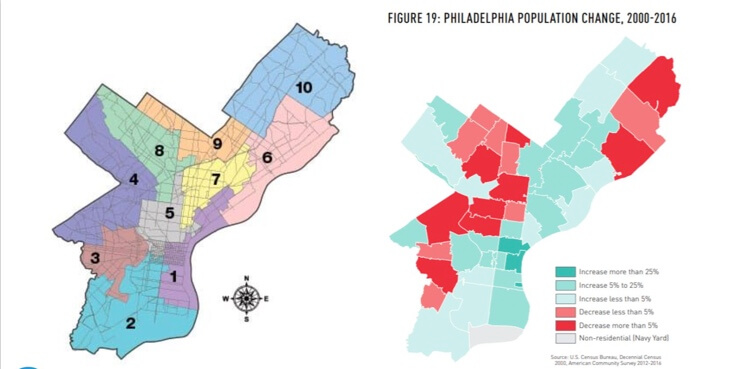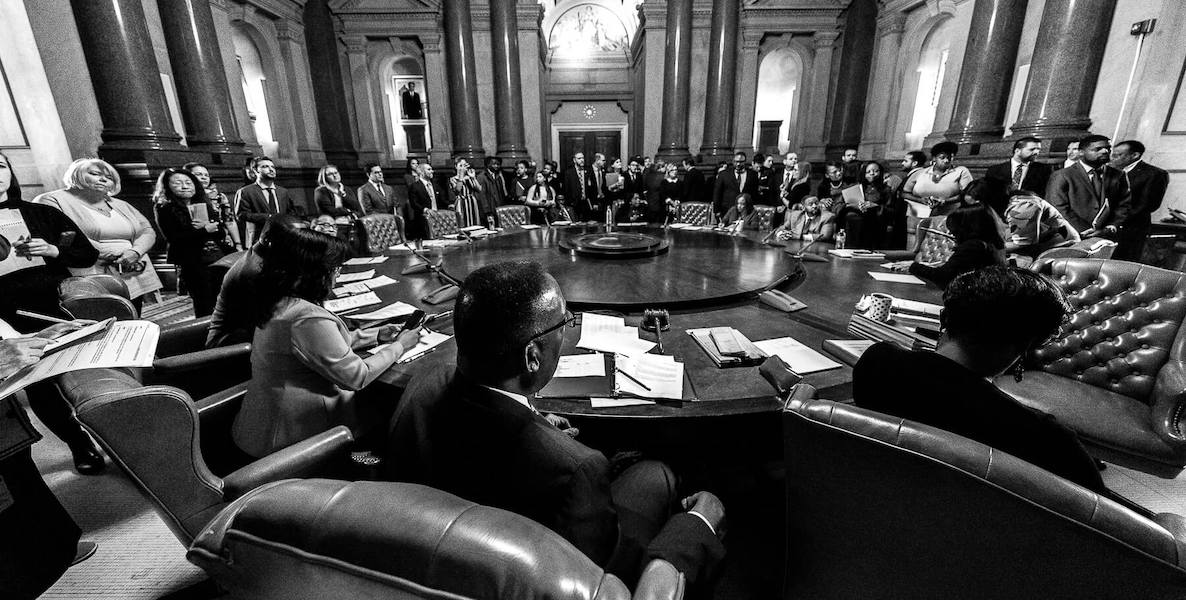With the new Census block group data expected to be released next month, a six-month countdown is about to begin for City Council to draw new maps for the 10 Council districts.
Just like how districts for Congress and the state legislature are required to be redrawn once a decade, Philadelphia’s Charter also requires City Council districts to be redrawn every 10 years.
The districts are drawn by currently elected councilmembers, rather than an independent commission, and the only requirements from the Charter are that each of the 10 Council districts must have “as nearly as possible” the same number of people, and that each district shall “consist of a ward or contiguous wards.”
So the districts have to contain a roughly equal population—within 10 percent—and have to be contiguous. And councilmembers of course have to live in the districts where they serve. The Charter also says that if Council doesn’t adopt new maps within six months of when they receive the Census data, they stop getting paid, so there’s a strong incentive to get this done on time.
Most of Philadelphia’s population growth in recent years took place within that 2010-2020 window, setting up a potentially very contentious debate over redistricting as the members vie to hold onto their strongest voting blocs, when not everyone can.
If the data is released in mid-August as federal officials have signaled, that would put the deadline sometime in March of 2022. to adopt new maps or else they stop getting paid, so there’ll be a fairly tight window for action that will close around March 2011, depending on when the Census data is released. Read Committee of Seventy’s FAQ on Council redistricting from 2022 for some more background.
We don’t know for sure yet what the enumerated count is going to show for each district, but the American Community Survey estimates each year give us a picture of the broad trends, and it’s becoming clear which parts of the city have grown or shrunk the most since 2010. Most of Philadelphia’s population growth in recent years took place within that 2010-2020 window, setting up a potentially very contentious debate over redistricting as the members vie to hold onto their strongest voting blocs, when not everyone can.

Lauren Vidas, writing in the Inquirer, lays out the political stakes of redistricting and warns that City Council is only required to hold one public hearing about redistricting, by which point they may just be presenting what is already a done deal, rather than seeking input from constituents.
The existing process is opaque and by its very nature, political. It is one that usually takes the form of direct negotiations between contiguous district Councilmembers. Council is required by the Home Rule Charter to hold only a single public committee hearing in order to give approval to the proposed lines before a final vote. However, by the time that committee hearing is scheduled, Councilmembers have usually already reached an agreement.
After its last session meeting June 24, after which it recesses for the summer, City Council has the opportunity to plan for a robust public engagement process for redistricting in the fall. Allowing community groups and constituencies a chance to weigh-in prior to negotiations is a critically important step to building confidence and public trust in the process. Prior to the pandemic, Council held neighborhood budget hearings to allow a forum for residents to weigh in. I urge them to consider doing the same before the ink is set on our new municipal district maps.
Because the legal requirements for public engagement on redistricting are so sparse, residents need to create other types of leverage and start talking to their councilmembers now about what they want to see.
As Vidas points out, many neighborhoods are split into two or three different Council districts today, making it harder for residents of those places to get their concerns addressed in City Hall, and she suggests a good guiding principle should be “one neighborhood-one Councilmember.”
We’ll be following this issue closely and bringing you updates and opportunities to get involved in advocating for your neighborhood in redistricting this fall, so watch this space for more information as it becomes available.

Jon Geeting is the director of engagement at Philadelphia 3.0, a political action committee that supports efforts to reform and modernize City Hall. This is part of a series of articles running on both The Citizen and 3.0’s blog.
Header photo by Jared Piper



